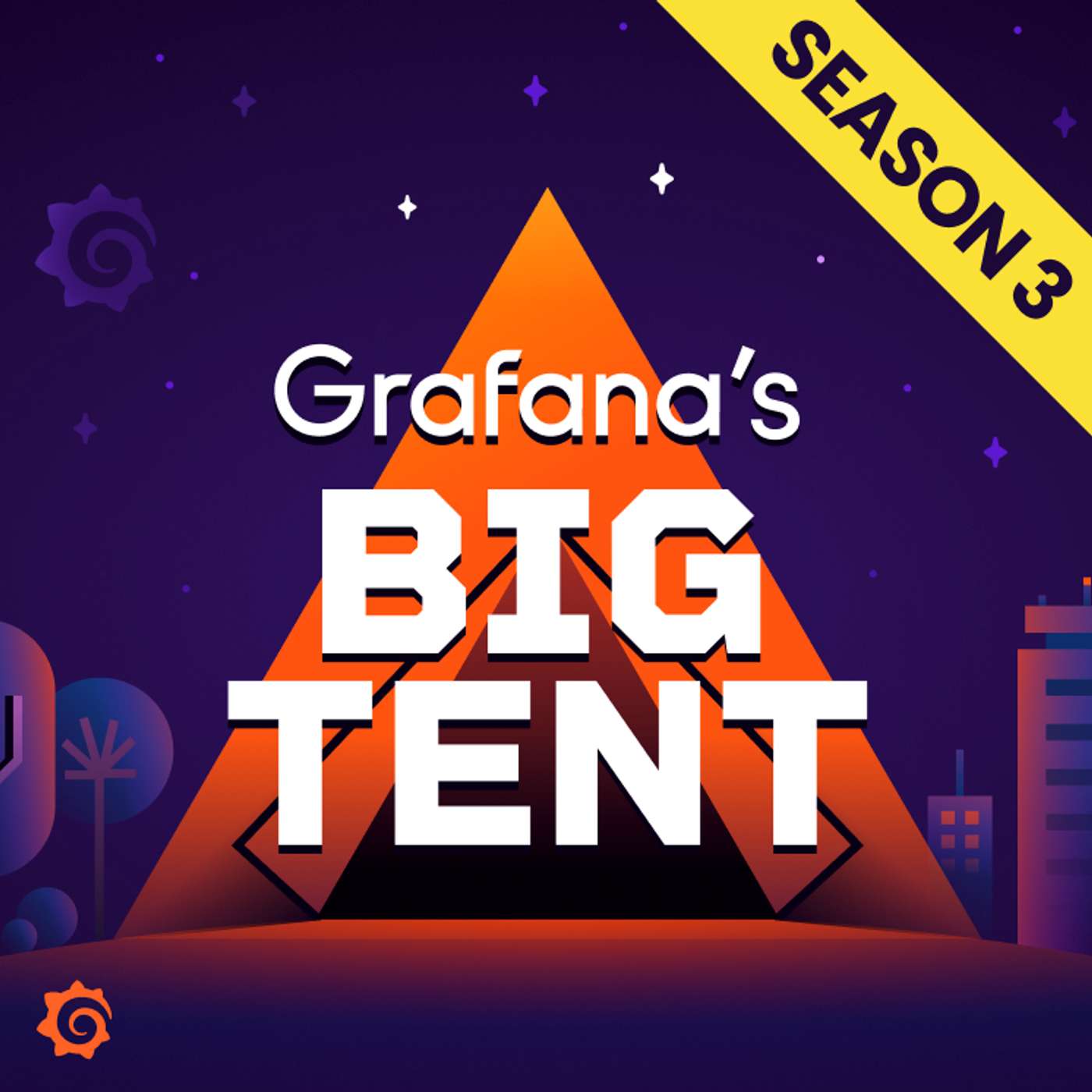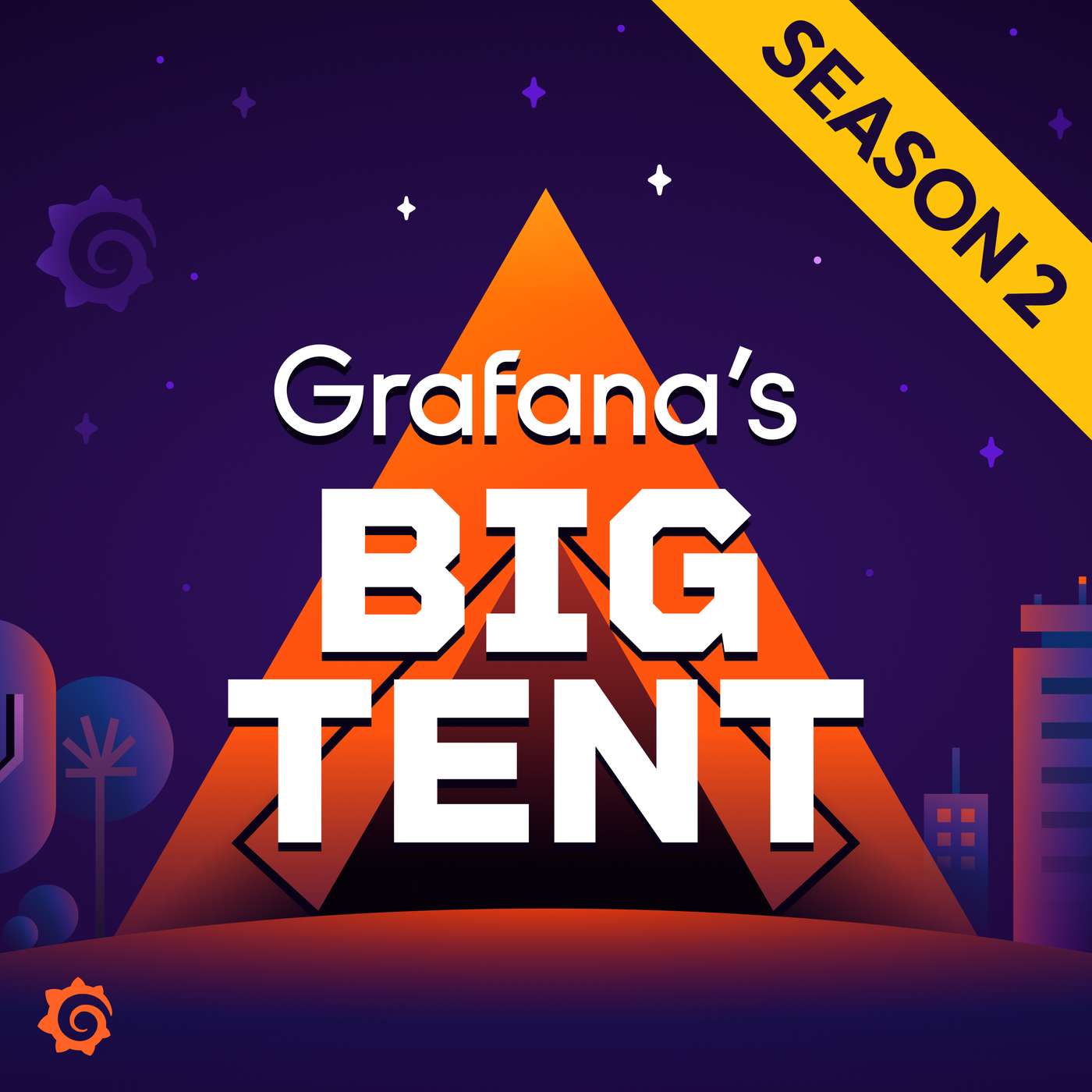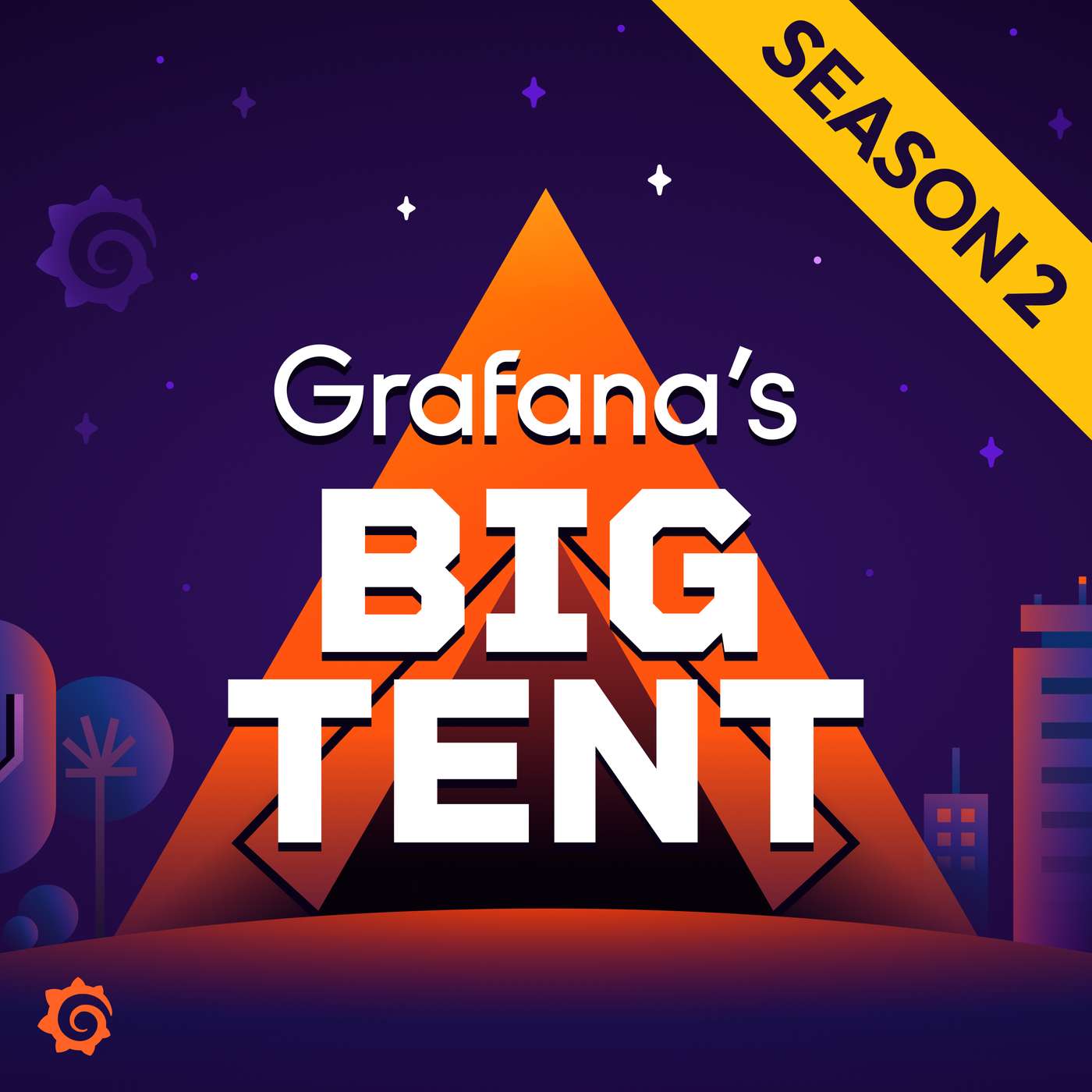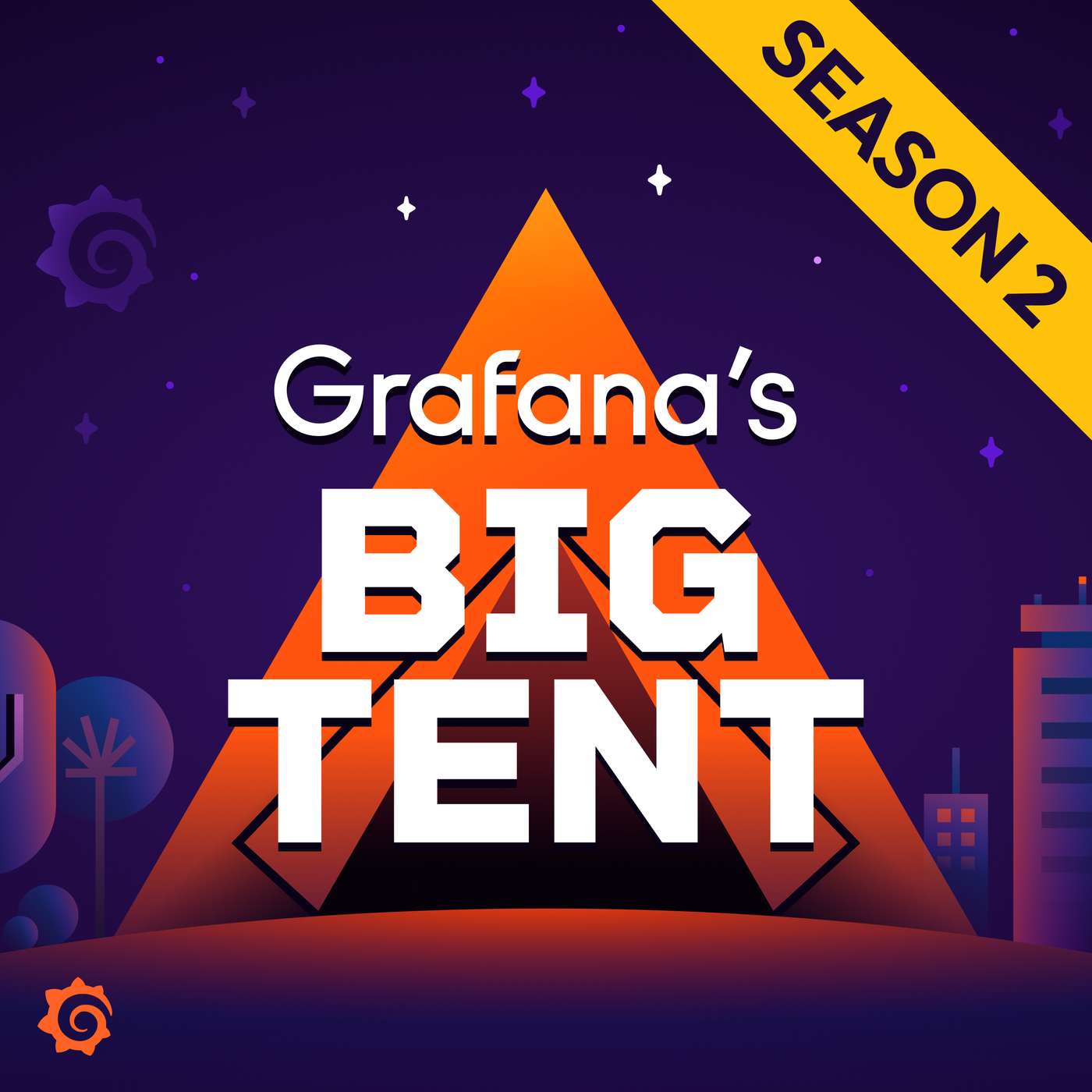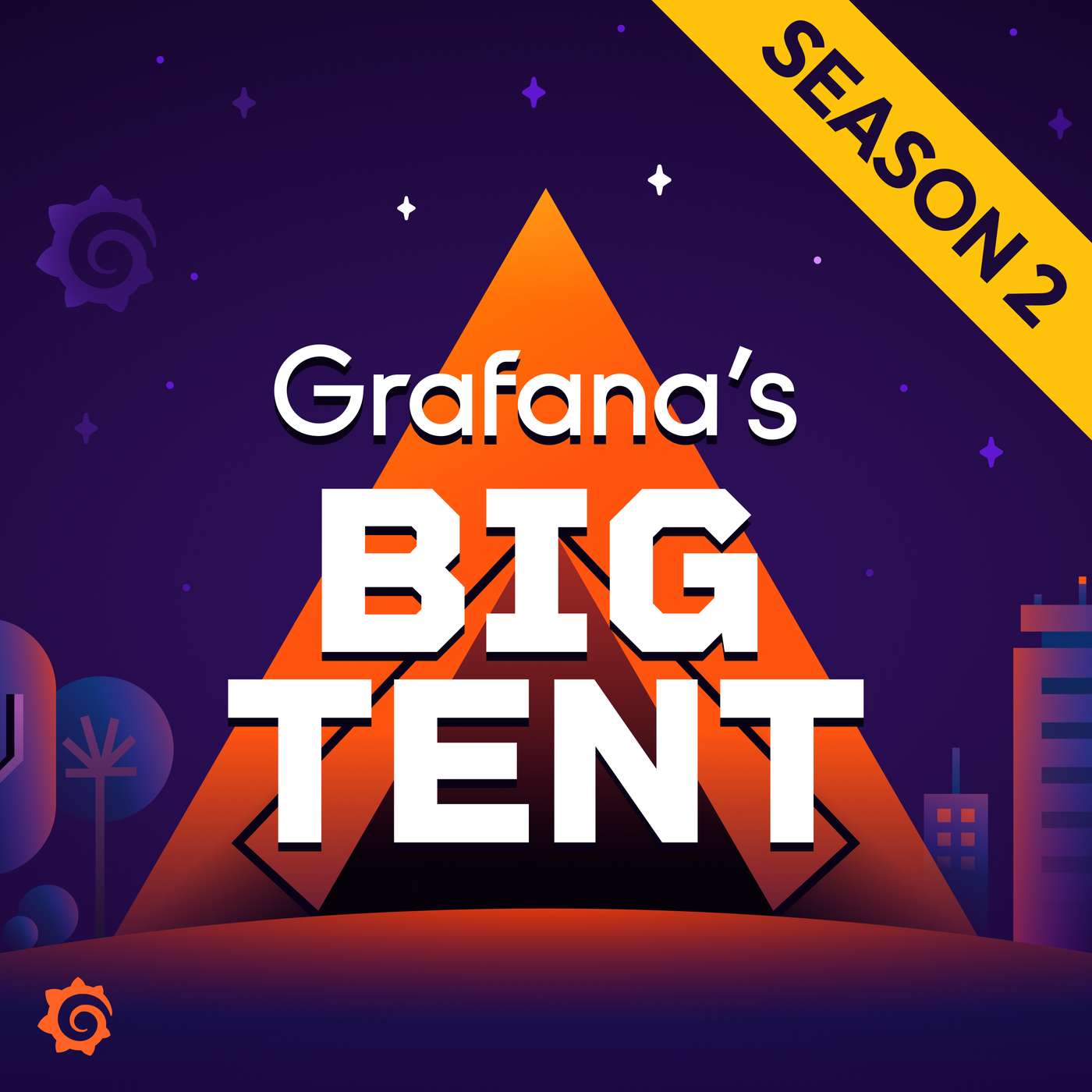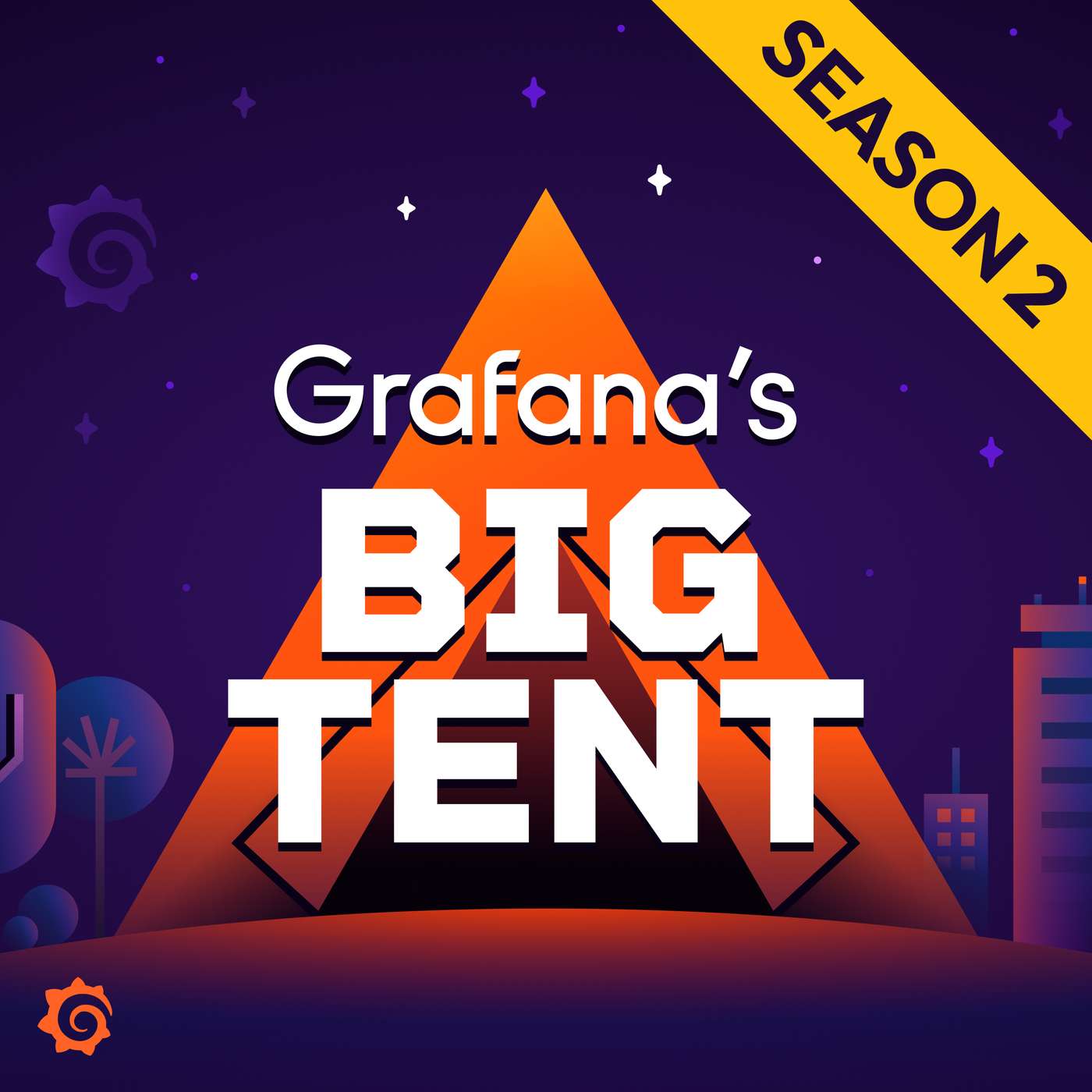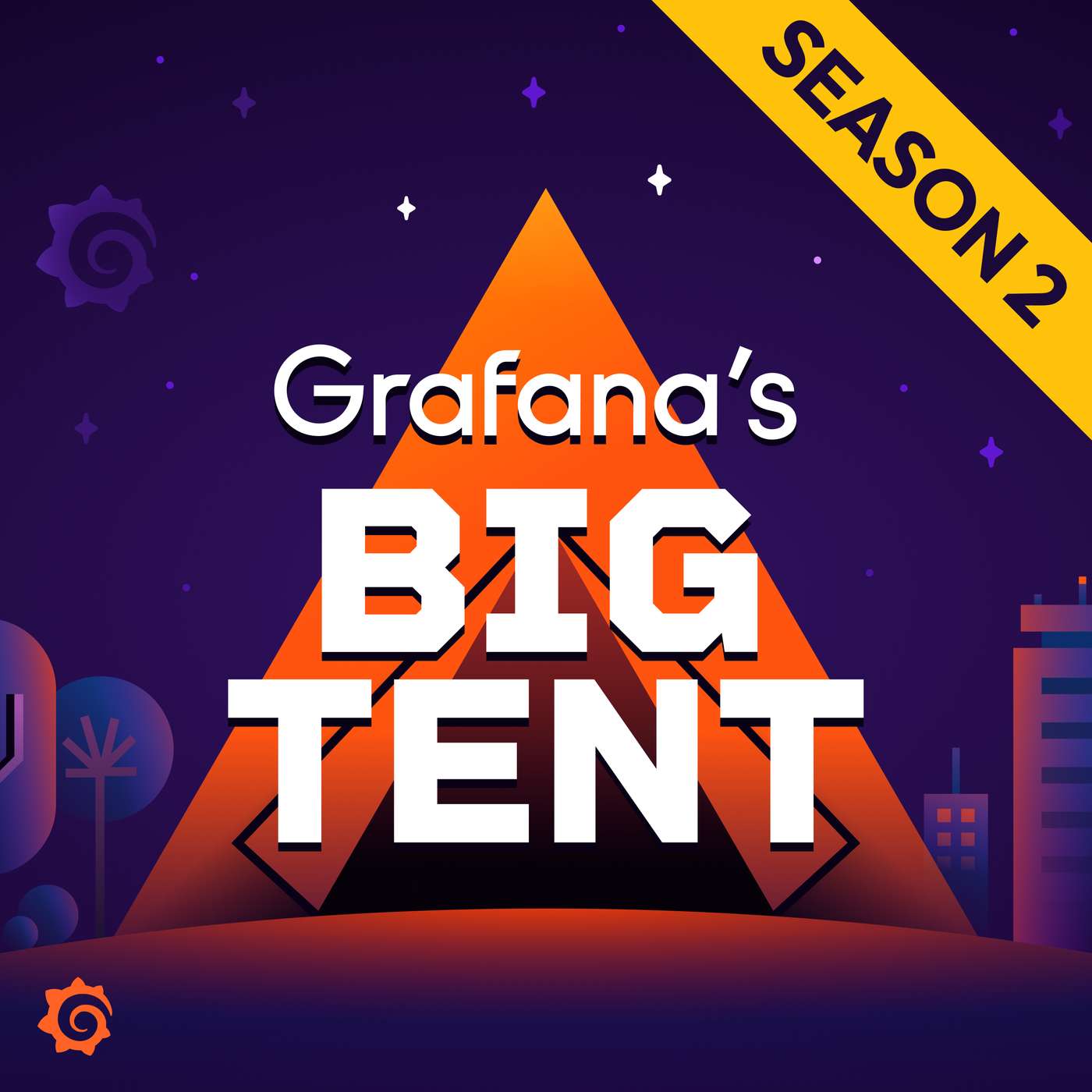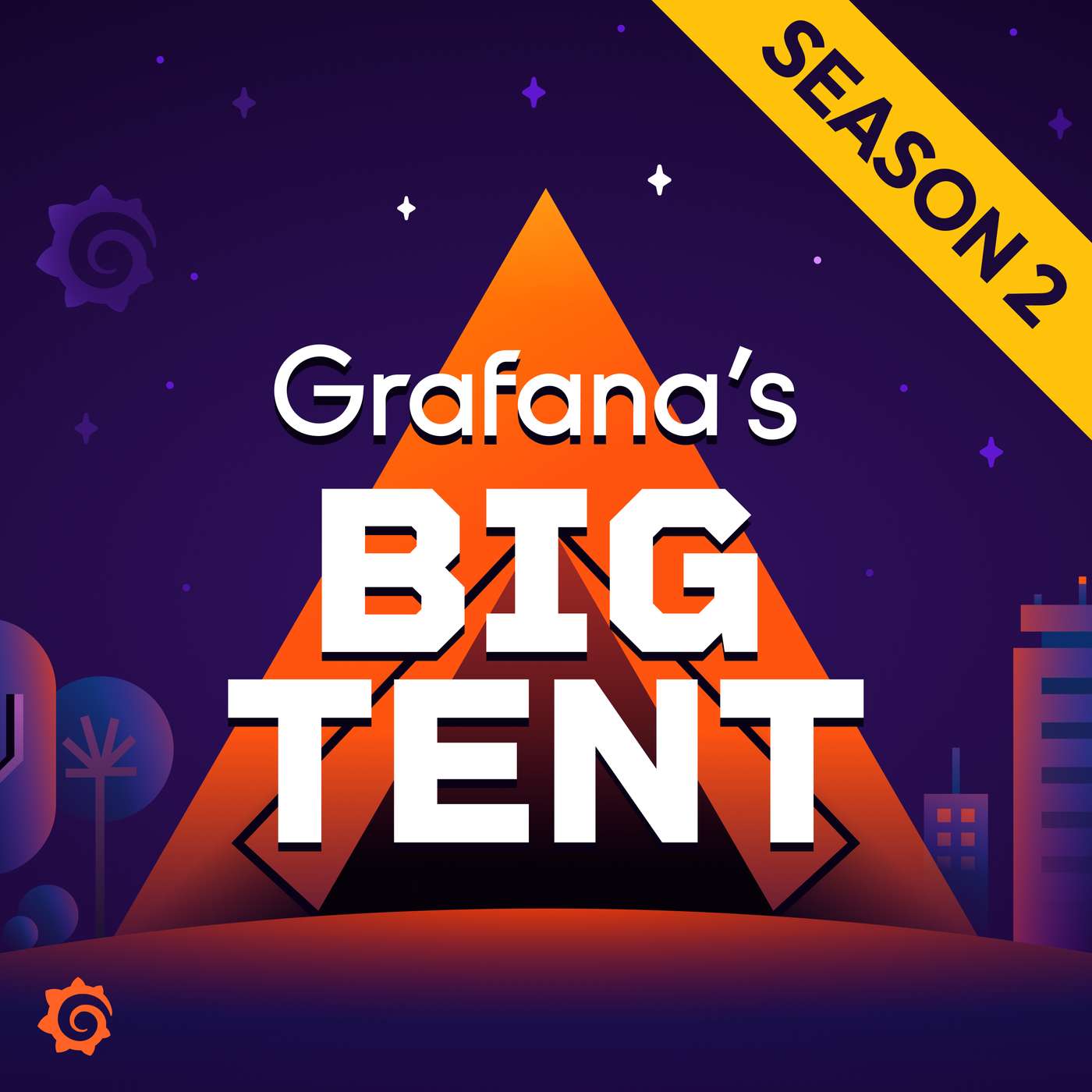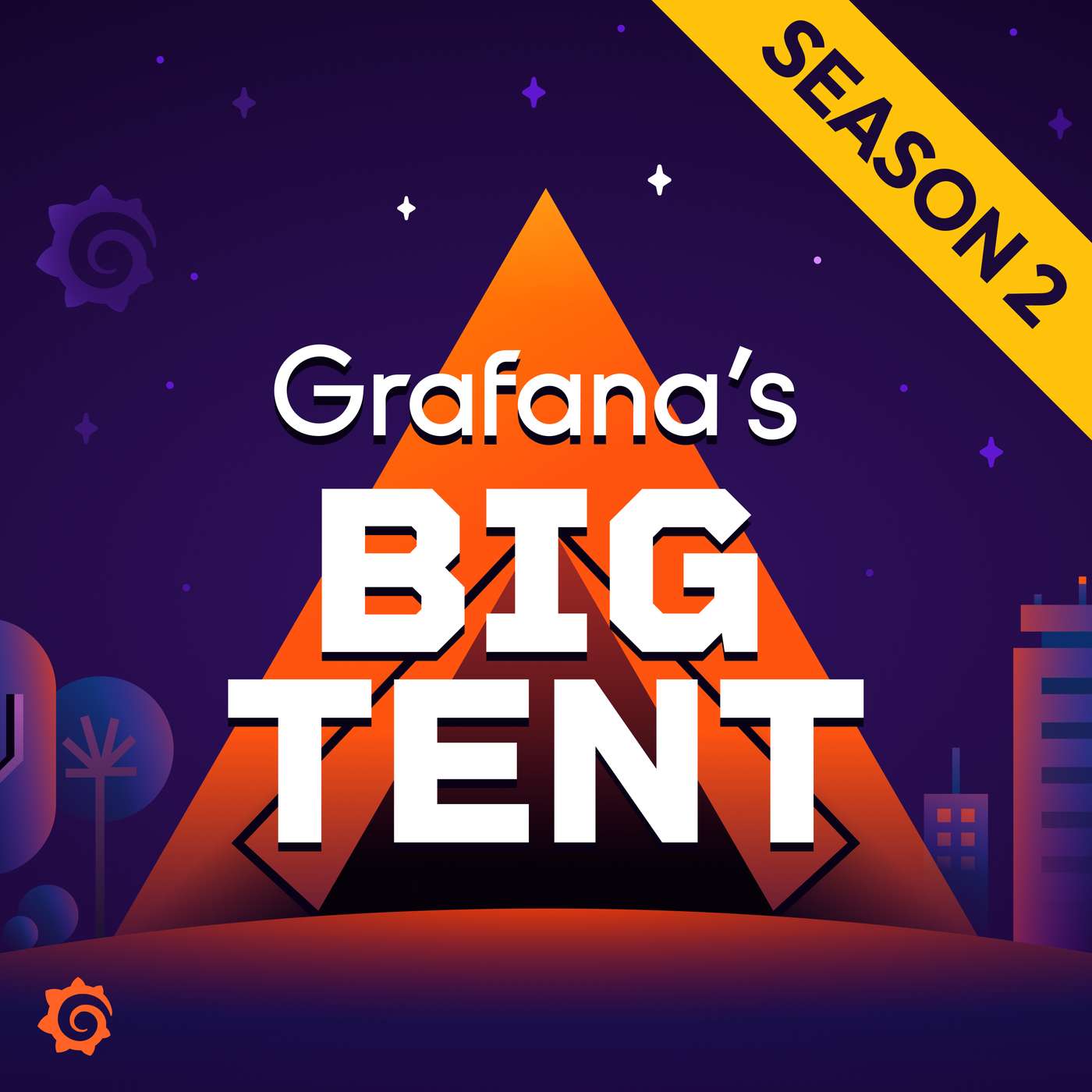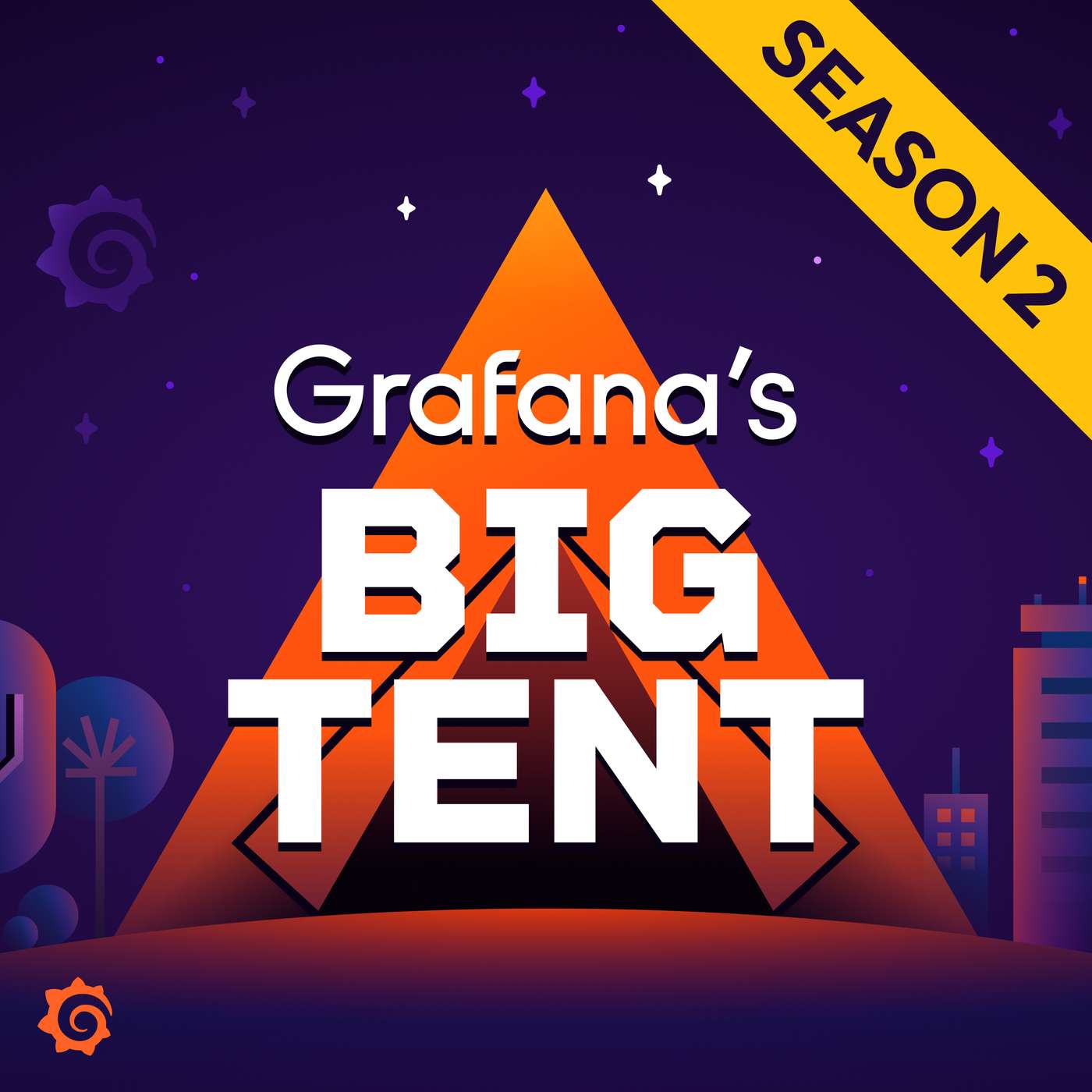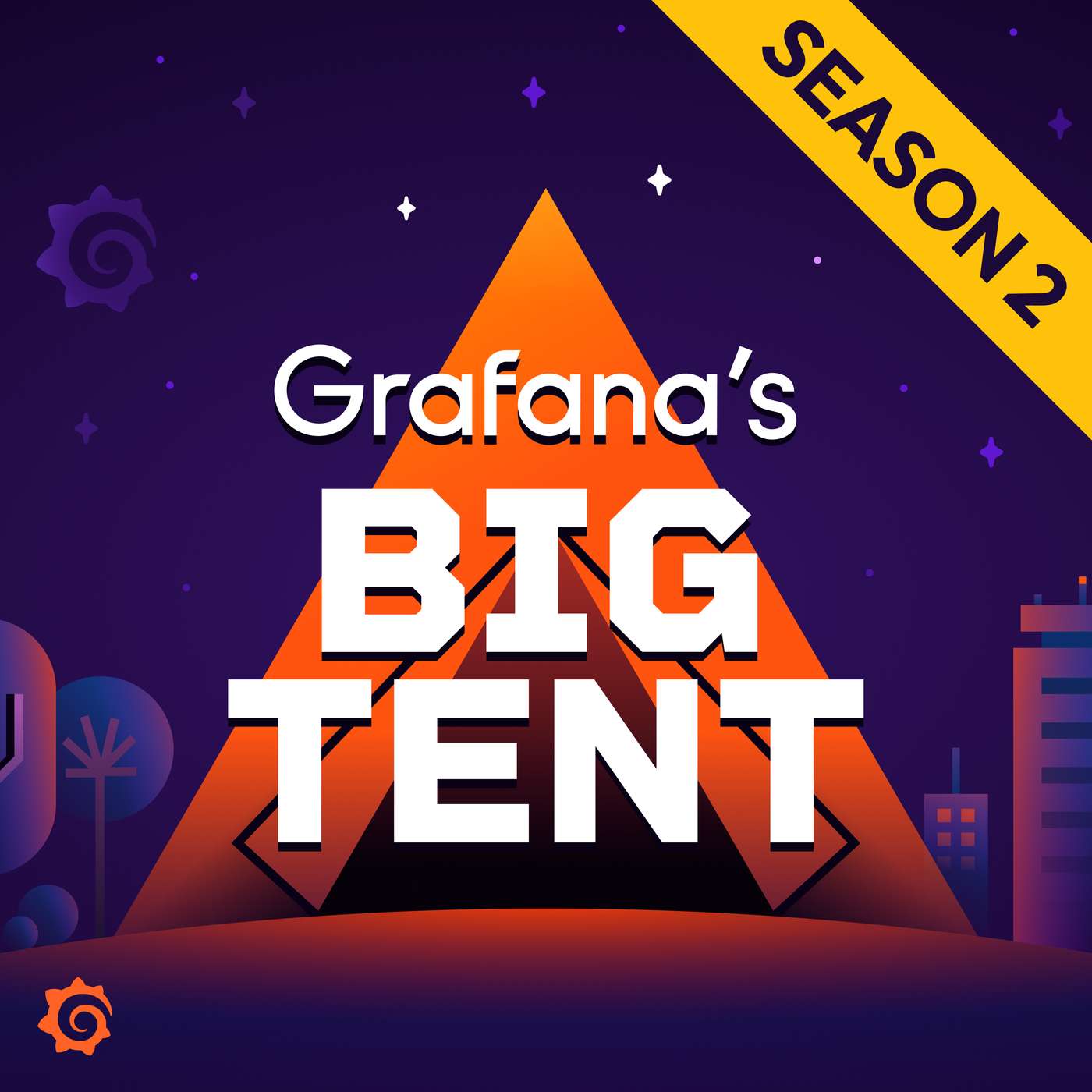Discover Grafana's Big Tent
Grafana's Big Tent

22 Episodes
Reverse
Recorded live at GrafanaCon Seattle, hosts Mat Ryer and Tom Wilkie kick off Season 3 of Grafana’s Big Tent by welcoming Ivana Huckova (Staff Software Engineer, Grafana Labs), Andrew McCalip (Head of Research and Development, Varda Space Industries), and Brad Fitzpatrick (Chief Engineer, Tailscale). They swap first-tinkering stories and laugh through IoT wins and fails (dog happiness monitors, candle sensors—oops). Andrew explains how his self-righting, foam-filled autonomous boat survives the open seas, while Brad shares how he uses AI to 3D-print OpenSCAD parts on demand.
In the season two finale, hosts Tom Wilkie and Mat Ryer are joined by Richard "RichiH" Hartmann, Director of Community at Grafana Labs, and Pavel Strobl of Prusa Research to explore the intersection of 3D printing and observability. Prusa Research not only produces 3D printers that both Tom and Richi use to create everything from wind tunnels to miniature Grots, but the company also uses Grafana internally for their own systems, making this a dynamic conversation about how Grafana is being used to monitor and improve physical manufacturing processes as well as IT infrastructure.
Two members of the OpenTelemetry governing board, Daniel Gomez Blanco and Juraci Paixão Kröhling, join Mat and Matt to dive deep into the evolution of OTel from its early days (including the story of how OTel got its name) to its current state and future roadmap.
Hosted by Tom Wilkie, this week's episode features Thomas Dullien, former Co-Founder and CEO of Optimyze; Bryan Boreham, Grafana Labs' distinguished engineer; and Senior Software Engineer at Grafana Labs and member of the CNCF Environmental Sustainability TAG Niki Manoledaki. Together, they delve into the complex world of cloud resource management and sustainability and explore the intricate challenges of optimizing Kubernetes clusters, from understanding allocation versus utilization to developing strategies that reduce waste and carbon footprint.
Join hosts Tom Wilkie and Mat Ryer along with Torkel Ödegaard, the creator of Grafana, and Mitch Seaman, Senior Product Director for Grafana, as they dive into the making of Grafana 11 and explore how the observability platform is evolving to meet the needs of both novice and expert users. From how hackathon projects are transformed into major features like Explore Metrics and Logs, to the years-long journey of replacing Angular, they share the technical challenges and achievements behind Grafana's latest major release. The conversation covers improving the getting-started experience, adding enterprise features like cloud migration tools, how Grafana's development process has matured, the upcoming roadmap for datasources, and so much more.
Hosts Tom Wilkie and Matt Toback sit down with guests Liz Rice from Isovalent and Mario Macías from Grafana Labs to explore how eBPF is revolutionizing observability, networking, and security in modern infrastructure. They cover what eBPF is (hint: it's no longer just about packet filtering!), the performance advantages of eBPF-based instrumentation compared to traditional methods, what's in store for the future of eBPF, and so much more. Liz and Mario also share their firsthand experiences developing widely-adopted eBPF tools like Cilium, Tetragon, and Grafana Beyla, offering practical insights into how these technologies are transforming observability (and making it awesome!).
In this episode of Grafana's Big Tent, hosts Mat Ryer and Tom Wilkie dive into the world of monitoring Kubernetes with guests Vasil Kaftandzhiev from Grafana Labs and Dio Tsoumas who leads the DevOps team at the consumer research company GWI. They explore why traditional monitoring techniques aren't enough for Kubernetes environments and discuss the evolving landscape of observability in cloud-native architectures.
Join host Mat Ryer as he explores the world of Adaptive Metrics with Grafana Labs engineers Patrick Oyarzun and Mauro Stettler, alongside guest Oren Lion from TeleTracking. What started as a hackathon project has evolved into a game-changing feature that helps organizations manage their metrics more efficiently and cost-effectively. They discuss the challenge of metric cardinality explosion in modern cloud-native architectures, the journey from prototype to production, and balancing cost savings with data accessibility and reliability. Whether you're dealing with metric overload or just curious about the latest in observability, this episode will help you understand how organizations are tackling the challenge of metrics management at scale.
In this episode of Grafana's Big Tent, host Matt Toback explores the world of DDoS protection and observability with guests Alex Forster, Engineering Manager at CloudFlare, and Dee Kitchen, VP of Engineering at Grafana Labs. They discuss the challenges of detecting and mitigating DDoS attacks, the importance of automation in maintaining high availability, and the intricate balance between observability and control in modern tech infrastructures. From explaining complex concepts through relatable metaphors to discussing real-world experiences with state-level attacks, this is an episode you won’t want to miss.
In this episode, hosts Tom Wilkie and Mat Ryer are teaming up with Grafana Labs’ Devin Cheevers and Prezi’s Alex Koehler to tackle the world of on-call responsibilities and incident management. Alex digs into Prezi's tech stack and provides a real-world look at observability practices and the lessons learned from managing a complex microservices architecture. Tune in to hear best practices for balancing innovation and reliability, but stay to hear everyone share the worst incident they’ve caused.
To kick off season two of Grafana's Big Tent podcast, our host Mat Ryer is back and he's bringing along some heavy hitters! Get ready for a deep dive into the world of caching with Memcached maintainer Alan Kasindorf (aka dormando), along with caching aficionados Danny Kopping and Ed Welch. They’ll discuss CPU-level to application-level caching and share strategies that supercharge performance, especially in high-traffic, distributed systems like Grafana Loki.
From the saddest log line in the multiverse to how metrics, logs, and traces are like a mother sauce, our intrepid hosts, Mat Ryer, Matt Toback, and Tom Wilkie, have been joined by distinguished guests to tackle a wide-range of discussions (not to mention a few conversational detours). For a special bonus episode to cap off the first season, Mat, Matt, and Tom got together to share their favorite episodes from the past season and plot their plans for the next one.
Note: This episode contains a couple of curse words. If you have sensitive ears nearby, maybe save it for later.In this special episode, Grafana Labs' founders Raj Dutt, Anthony Woods, and Torkel Ödegaard answered a wide range of questions about the past, present, and future of the company — and how the people behind the products have always been the driving force behind its success. Recorded live at GrafanaFest, the company-wide event that brought together more than 600+ Grafanistas from around the world in Whistler, British Columbia, Raj reminded everyone who was gathered, "we're in this together. We are building relationships that are going to last beyond this company, whatever our personal journeys are."
Darren Murph, Head of Remote at GitLab and author of Living the Remote Dream, joins host Matt Toback to discuss all the advantages of adopting a remote work culture and, in turn, creating a more positive, results-only environment. "There shouldn’t be a focus on availability and visibility," says Darren. "The idea is that we focus on the results. We care a lot less about how you get there, or the clothes you wear while you’re doing it, or at what time of the day or week you accomplish it." Luckily, they also won't care if you take time to listen to this episode and learn more about the personal benefits of remote work and how you can advocate for this shift in your workplace. Added bonus: Instead of all those "This-could've-been-an-email" meetings, your in-person gatherings will quickly become more productive and meaningful.
Three times a year, Grafanistas can take a week away from their day jobs and invest their creative energy into a company-wide hackathon. In this episode, winners from the recent Grafana Labs hackathons share what motivated their teams to deliver successful projects. (It's not just the prize money—though that helps.) You'll also learn more about the judging process and which projects landed on the product roadmap.
Lego Group principal engineer Nayana Shetty swaps observability survival stories (to drill or not to drill?) with hosts Mat Ryer and Matt Toback. The trio also reveals new and different observability strategies that have been successful and effective in their organizations. Plus: Nayana shares how she built her successful observability career brick by brick.
What's the saddest log line in the multiverse? How do you store logs efficiently? Grafana Labs Software Engineer and Grafana Loki tech lead Ed Welch covers everything you need to know about logs and shares some of his tricks for logging at scale with Grafana Loki. Plus: Learn about the logfmt chants you didn't know existed in the Go community!
Grafana Mimir maintainers have taken over the mic! Marco Pracucci and Cyril Tovena —both software engineers at Grafana Labs — will give you the origin story behind Grafana Mimir, the most scalable, most performant open source time series database in the world. Plus: learn what new features will be coming to Mimir soon and find out the other Norse name the team considered for the project.
Discover why service level objectives are buzzworthy and changing how we do business. Special guests include Parca software engineer Matthias Loibl, who co-created the open source SLO software Pyrra with Nadine Vehling, and Grafana Labs principal software engineer Bjorn "Beorn" Rabenstein, who we are trying to clone for the good of everyone's observability strategies. References discussed in this episode:Google’s SRE siteGoogle's SRE book (SLOs are in Chapter 5)Alerting on SLOs at Soundcloud blog post by Beorn Rabenstein"Should SLOs be request-based or time-based? Why neither works" at SLOconf presented by Beorn RabensteinHow to include latency in alert-based SLOs by Beorn RabensteinImplementing service level objectivesPyrra project co-founded by Matthias Loibl and Nadine Vehling
At KubeCon Europe 2019, Polar Signals Founder and CEO Frederic Branczyk predicted that continuous profiling was the future of observability. Fast forward three years, and he's not wrong. In this episode, we'll discuss how Polar Signals' open source tool Parca is leading the conversation around continuous profiling, how it reduces overhead costs thanks to eBPF, how Parca has grown its passionate community, and perhaps most importantly, what cute animal will become the Parca mascot.


